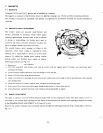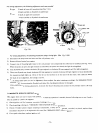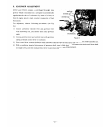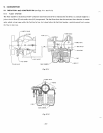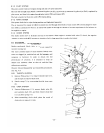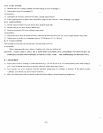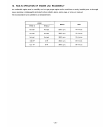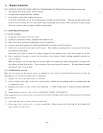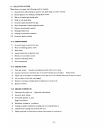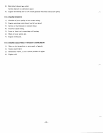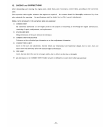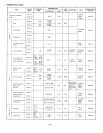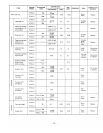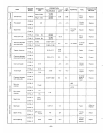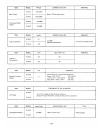
1.1.
TROUBLE
SHOOTING
For
a satisfactory starting and running conditions
of
a
gasoling engine, the following three requirements
must
be met:
I.
The cylinder filled with a proper fuel-air mixture.
2.
An appropriate compression in the cylinder.
3.
Good spark at correct time to ignite the mixture.
If
all three requirements are not met simultaneously, an engine can not be started. There are also other factors such
as
heavy load at starting and too long exhaust pipe causing high back pressure, which contribute to hard starting.
The most common causes
of
engine troubles are given below.
11-1 STARTING DIFFICULTIES
11-1-1
FUEL SYSTEM
1)
No gasoline in fuel tank,
or
fuel cock closed.
2)
Carburetor insufficiently choked, especially when engine is cold.
3)
Water, dirt
or
gum in gasoline hindering flow of fuel to carburetor.
4) Inferior
or
poor grade gasoline not vaporizing satisfactorily to produce correct fuel mixture.
5)
Needle valve in carburetor held open by dirt
or
gum. This condition is ascertained by c continuous fuel drip from
the carburetor during idling.
Sometimes, this trouble is remedied by lightly tapping the float chamber with a screw driver handle
or
the like.
6)
Due to carburetor flooding, too much
fuel
introduced
in
the cylinder through cranking, making the mixture too
rich
to
he ignited.
When this happens, remove spark plug and turn the engine over several times with starting pulley to evac’uate over-
rich mixture through the plug hole. Keep carburetor choke open during this operation. Dry spark plug thoroughly
and reinstall, and try
to
start again.
11-1-2 COMPRESSION SYSTEM
When the fuel system and the ignition system are eliminated as the cause
of
starting difficulties and
loss
of
power, the
following are to be chccked for possible lack
of
compression.
1)
Cylinder dry after long interruption of operation.
2)
Loose
or
broken spark plug. In this case,
a
hissing noise
is
audible, during cranking, made by escaping mixture
gas
in compression stroke.
3)
Damaged head gasket or slack cylinder head tightening. A similar hissing noise is produced during compression
stroke.
4)
Tappet clearance incorrect. (See
“6-3-8,
6)
ADJUSTING TAPPET CLEARANCE”)
If
the compression is not recovered after correcting the above faults, the engine must be partly dismantled and the following
must he checked.
h
I)
Valve stuck open due to carbon or gum on valve stem.
‘7)
Piston rings stuck
in
piston
due
to
carbon accumulation. Remove piston and connecting rod from engine and
clean, correct or replace parts.
-26-



